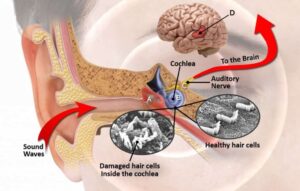TMS For Tinnitus
Transcranial Magnetic Stimulation (TMS) For Tinnitus
What is Tinnitus?
Before discussing TMS for tinnitus, let’s make sure we are on the same page about what tinnitus is. Tinnitus is any sound that a person can hear that is not coming an external source. Tinnitus is not dangerous or deadly, but it can be very distressing. The volume of the sound can range from barely noticeable to very loud, disrupting a person’s ability to relax, concentrate, sleep, etc.
According to The Lancet, the prevalence of tinnitus in the United States is 11.2% in 2014. Of that 11.2%, 41% always had symptoms and 28.3% had been affected for more than 15 years. There are many known treatments for Tinnitus, not all of them are effective. If in need of another option to address your tinnitus, TMS for Tinnitus is an option. Before learning about TMS for tinnitus, click here to learn more about tinnitus in general.

TMS For Tinnitus vs. TMS For Depression
The target location to treat depression is the Left Dorsolateral Prefrontal Cortex (LDLPFC). The magnetic field of a TMS machine focuses on only that location, minimizing the side effects. This gives TMS an advantage over medications, that function by traveling the body systemically in the blood stream. The mechanism of action of TMS is explained here.
There are protocols and studies that show tinnitus is effective for people suffering from the condition. The difference between TMS for tinnitus and TMS for MDD are differences between the frequency and intensity of stimuli.
1.) Standard TMS for depression is effective with high frequency pulses (10 Hz) and 120% intensity on left side.
2.) Standard TMS for tinnitus is effective with low frequency pulses (1 Hz) and 110% intensity
How Is Tinnitus Typically Treated?
Treatment for tinnitus may depend on what caused it:
- Hearing aid: if your tinnitus is noise induced or caused by age
- Medication adjustments: some medications are ototoxic
- White noise machines:
- these can create white noise outside of the ear canal– possibly helping patients sleep
- There are also white noise machines that can be inserted into the ear like a hearing aid
- Therapy:
- Tinnitus retraining therapy– this therapy combines a noise machine and counseling in a manner similar to exposure/response. This will train the body to be desensitized to the sound
- Cognitive Behavioral Therapy/ Acceptance and Commitment Therapy– these modalities can help people manage the stressors of tinnitus
- TMS: TMS can inhibit the activity (low frequency) of the hyperactive parts of the brain associated with hearing. (Example: Hyperactive audio cortex)
Does Insurance Cover TMS For Tinnitus?
Insurance companies do not cover TMS for Tinnitus. There is evidence that suggest effective results for people suffering from tinnitus. Without insurance coverage, you would have to pay out of pocket. Every provider sets a different rate, so you’ll need to contact your local provider for more details.
Summary Of TMS For Tinnitus
If standard treatments of tinnitus are not effective, TMS is another great option. 20-50% of patients that try TMS see an improvement in their tinnitus symptom. This is not surprising, as TMS works for a number of conditions in a safe and effective way. It seems that the ability to stimulate and/or inhibit nerve cells in the brain are the key to offering neurological relief.
If interested in scheduling an appointment and speaking with a doctor, use the “Book A Discovery Call” button or enter your information below. A representative will contact you in the order your request was received. Office is located in Glendale, CA.
